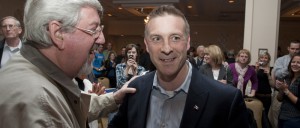Sitting down with local politicians

Catherine Fife, NDP Member of Provincial Parliament for Kitchener/Waterloo:
Q: How would you like to engage with students in the upcoming school year?
A: “I met with LSPIRG, the research group, and I also met with the Laurier co-op program coordinator to discuss possibly having a co-op student here in my office. We’ve never had that here and I thought that would be a great opportunity to provide a co-op learning experience. I was in a meeting with LSPIRG — they are planning a social policy forum, translating activism into policy and practice, and I agreed to be a speaker, as well as [participate in] a Women in Politics session as well. They are planning on doing a forum.
I’m hoping to have a very positive and proactive discourse on women in politics with the student body. I have a really good rapport with the Students’ Union and with the students and I hope to continue to build momentum on that.”
Q: How do the students affect the community in Kitchener-Waterloo?
A: “The student body for Waterloo has a profound effect on the energy and the economy, quite honestly. It’s in our collective best interests to have a very positive relationship. In order for that to happen you have to build relationships.I really do want to make sure that students know that they can reach out to us. We’ve had a number of students that have come into the office over the summer that have done canvassing with me, which was really great as well.
I’m here to help students and if they want to also get involved in a political way with our office, they are always welcome to do so. It seems to be a growing trend either through social media or people talking to each other.”
Q: Are you satisfied with the level of student involvement in the community?
A: “I know that there are a number of events that Laurier participates in, like food bank drives, toy drives and of course the number varies. But I think that part of feeling connected to a community is actually being involved. We always get calls from volunteers as well and sometimes it’s just a matter of connecting people to the right network in the community.”
Q: What are your biggest concerns for the upcoming school year?
A: The biggest concern for me is that students feel safe, included and welcome in the community. The transition for a lot of students is a hard time, so I think that making sure that they know where the support is in the community is key.”
Q: What advice would you offer to incoming students who are new to Kitchener-Waterloo?
A: I think my advice is take the time to get to know the community and find out where the best resources are, and to build relationships and try to make connections with people that live here. Waterloo is an incredibly welcoming community and it’s a great place not only to go to school, but to live. We have a lot of students that make Waterloo their home, which is key, I think. It’s indicative of what a great community it is.”
Editor’s note: This interview has been condensed.
———————————

Peter Braid Conservative MP for Kitchener/Waterloo
Q: How would you like to engage with students in the upcoming school year?
A: “I’m very proud to have two world-class universities in my riding of Kitchener-Waterloo. The community is very fortunate to have such a large student population contribute to the social and the economic life of our community. As an MP I take my relationship with the universities very seriously. I meet with student representatives from the two universities on a regular basis and I greatly value my relationship with student governments at both Wilfrid Laurier and the University of Waterloo.”
Q: Why do you think it’s important for students to be engaged in federal politics?
A: “It’s important for students to be engaged, because from engagement comes information and education. We’re fortunate to live in a democracy, and for our democracy to be well-functioning we need informed and engaged citizens and that starts with our young people.”
Q: How do the students affect the community in Kitchener-Waterloo?
A: “As I mentioned, we’re very fortunate to have such a large student population in Kitchener-Waterloo. Students inject youthfulness and vibrancy to the life of our community. In addition, it’s important for the community to respond and to serve the student population well, including the business community. It creates business opportunities for our local business community to serve students effectively.”
Q: Are you satisfied with the level of student involvement in the community?
A: “I think there is opportunity for improvement in terms of the level of student engagement in the community itself. I know that is one goal of student leaders on campuses and that is a goal that I strongly support. I think there’s a role for both the students and the community to play in seeing increased levels of engagement by our student population. It’s a two-way street — the students need to engage the community and the community needs to engage with the university campus.”
Q: What are your biggest concerns for the upcoming school year?
A: “I have no specific concerns regarding the upcoming school year. That said, my main priority is to strengthen our community and strengthen our economy, and that will remain a priority because I want to see that students have opportunities of full employment when they graduate.”
Q: How will the universities and Conestoga College continue to affect development in the Region of Waterloo?
A: “The universities and the college will continue to have a positive impact on the development of our region in terms of development in our city cores, improved public transportation and increased business opportunities, because of the size of the student population.”
Q: What advice would you offer to incoming students who are new to Kitchener-Waterloo?
A: “Take the opportunity to get to know our community and all that it has to offer. Study hard, but also live well. Know that every individual has the opportunity to make a difference.”
Editor’s note: This interview has been condensed.

